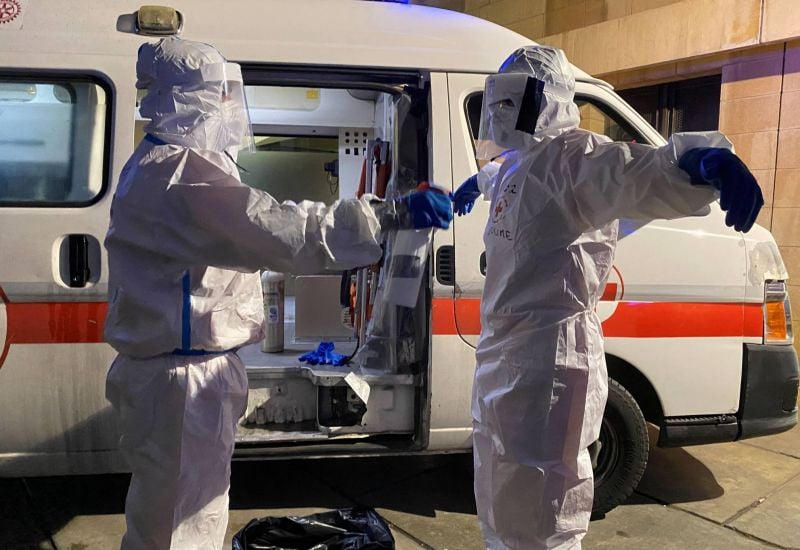
A volunteer from Lebanese Red Cross sanitizes his colleague at Rizk Hospital in Beirut. (Credit: Ayat Basma/Reuters)
BEIRUT — Despite a record number of deaths from coronavirus Tuesday, Lebanon should brace itself for a surge in hospitalizations and deaths in the coming weeks, health experts have warned, as cases continue their upward trend with hospitals already operating at full capacity.
The country saw a record 61 deaths Tuesday, while another 4,359 tested positive for COVID-19. The Health Ministry said that 2,176 patients were currently in hospitals battling the virus, with 799 in ICU and 246 on mechanical ventilation.
Yet despite numerous, grisly records set over the past week, the virus’ incubation period means that the corresponding surge in the number of hospitalizations and deaths is likely still to come.
“There’s an incubation period of up to 14 days and complications happen in the second week of infection,” Matta Matta, the chief of the infectious diseases department at Bellevue Medical Center in Mansourieh, told L’Orient Today.
This means that the number of people requiring hospitalization is expected to increase in the coming week. Hospitals across Lebanon are already scrambling to cope with the stream of new cases.
“The virus has established itself in the community and the solution lies with more testing, tracing and isolating positive cases,” he said, adding that PCR tests should never replace the 14-day quarantine period.
“People were getting tested after 3-4 days of exposure and going out after their test result came back negative before developing symptoms at a later date,” he said, explaining that in the interim, these people are spreading the virus.
Firass Abiad, the general manager of Rafik Hariri University Hospital, echoed this sentiment, saying that the “number of hospitalizations, including critical patients, is expected to increase.”
“The trend will continue moving upward, but it remains to be seen at what slope,” he said, adding that it would be determined by the effectiveness of the lockdown and the circulation of a new virus strain, the so-called UK variant, that first appeared in Lebanon on Dec. 21.
Abiad went on to reject claims that, with daily infection rates rising, Lebanon is approaching herd immunity status.
“Let’s assume that 1.5 million people contracted the virus up to now, that’s 25 percent of the population, which is way off the 60 or 70 percent needed to achieve herd immunity,” he said.
When taking into account that the immunity of survivors isn’t everlasting, the “theory of herd immunity becomes weaker,” he continued.
“We cannot withstand such daily infections much longer; it would lead to the collapse of the health care sector,” Abiad told L’Orient Today, warning against loosening restrictions before reeling in the spread of the virus.
Even though people’s compliance with the latest lockdown measures has improved according to Abiad, its long-term effects remain to be seen.
“We’re still in the first week, so it’s too soon to tell,” he said, adding that people are prone to becoming fatigued amid deteriorating living conditions and the lack of a social safety net.
His hospital, like most across Lebanon, is currently operating at full capacity with its 150 coronavirus beds occupied.
“We have reached our limit and cannot expand capacity more than that,” he said.
Rizk Hospital, another medical center in Beirut, is in a race against time to equip a 17-bed floor with negative pressure ventilation in anticipation of the surge in hospitalizations.
“We’re also fitting the emergency room with NPV to protect the staff,” nursing supervisor Bernadette Achy said.
While most hospitals are expanding their coronavirus capacity, the Health Ministry on Tuesday filed charges against the directors of four governmental hospitals for “their apparent laxity and failure to equip specialized departments for coronavirus patients, especially intensive care units.”
The statement released by caretaker Health Minister Hamad Hassan’s office accused the hospitals of Hasbaya, Qabr Shmoun, Qana, and Dahr al-Bashek of failing to set up their coronavirus wards despite being provided with “sufficient funds from the ministry more than three months ago.”
Biak Maalawi, the director of Hasbaya Governmental Hospital, denied the accusation, telling L’Orient Today that his facility “has a fully functioning coronavirus ward,” and adding that he’s awaiting clarification from the Health Ministry.
Representatives of the other hospitals could not be reached for comment.
Six days into a countrywide full lockdown that has barred vehicular traffic, cracks are showing in supermarkets’ ability to fulfill the vast number of delivery orders.
Yesterday, the chair of the Spinneys supermarket chain urged authorities to exempt grocery stores from delivery-only restrictions and allow people to obtain permission to shop in-store via the state’s COVID-19 Impact travel permission app.
Today, Nabil Fahed, the head of the supermarket owners’ syndicate, echoed those remarks. “I totally agree with this view and the syndicate supports this call and also to extend opening hours to accommodate shoppers with lower density at the stores,” he said.
Small stores are already violating lockdown measures and operating illegally, he said, leading to “unacceptable levels of crowding.”
The lockdown measures have also taken their toll on farmers due to a fall in supermarkets’ demand for produce.
“Farmers are suffering because we can only serve less than 10 percent of our demand, which means that we’re buying less produce,” Fahed said.
Yesterday, the head of the Bekaa Farmers’ Association, Ibrahim Tarshishi, said farmers were selling 80 percent less produce due to delivery-only restrictions for restaurants and supermarkets.